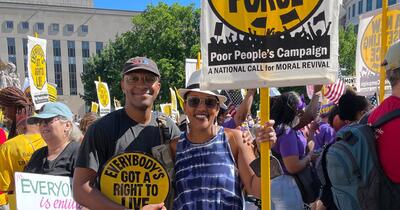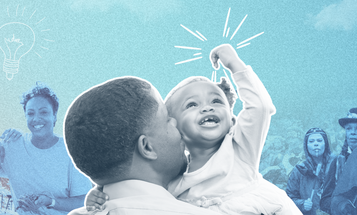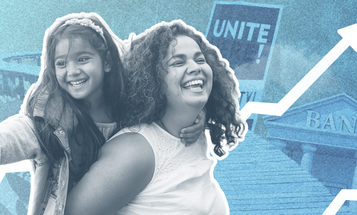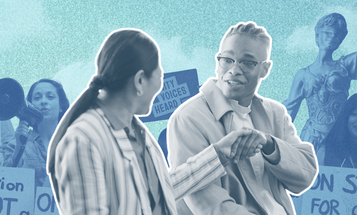
Forward Together: Juneteenth and the Poor People’s Campaign
Our nation’s leaders made Juneteenth a holiday—now it’s time they act on voting rights and economic justice for Black communities.

As the United States now officially commemorates Juneteenth, the country must take deliberate action to expand voting rights and enact programs to build wealth in Black communities.
Juneteenth—the day in 1865, 2 years after the Emancipation Proclamation, when enslaved Texans learned they were free—is a celebration of Black liberation. It’s also a reminder that it was no accident freedom came so late to Texas. As the United States now officially commemorates Juneteenth, the country must take deliberate action to expand voting rights and enact programs to build wealth in Black communities. In other words, for our nation’s leaders, this day must be about walking the walk as much as America talks the talk. And time out for just talking, we’ve seen enough of that.
On the eve of Juneteenth 2022, as I joined the Poor People’s Campaign’s march in our nation’s capital, it was clear that this sentiment is not mine alone. A hundred thousand people from all across the country joined in Washington, D.C. to challenge the evils of systemic racism and economic inequity.
I was pleased to march alongside Demos Movement Building Associate Joshua Harmon, who last year wrote, “the real work [of commemorating Juneteenth] lies in making practical changes, like taking action to reverse the long-term systemic methods of excluding people of color from our democracy.” Joshua named multiple steps our government could take to build a more inclusive democracy, such as:
- Pass the For the People and John R. Lewis Voting Rights Acts to expand the right to vote and curb voter suppression;
- Make Washington, D.C. a state, giving a majority Black and brown city voting representation in Congress, and;
- Eliminate the filibuster, a Jim Crow-era procedure currently blocking critical legislation, including the above bills, that would build power for Black and brown communities.
One year later, sadly, none of these steps—which hold potential to be transformative for Black people —has come to fruition. Neither did Build Back Better, President Biden’s $3.5 trillion economic policy package, which would have benefited Black Americans in a number of areas: cutting child poverty by 40 percent, according to the Center on Budget and Policy Priorities, with the sharpest reductions for Black and Latino children; expanding the Section 8 voucher program, which enables its recipients—two-thirds of whom are people of color—to buy or lease safe, dignified housing; and guaranteeing access to affordable pre-school for all 3- and 4-year-olds, regardless of income.
Today, unchecked capitalism blocks policies that would build power for Black people.
In celebrating Juneteenth the day after the Poor People’s Campaign’s march, I could not help but think about the inextricable link between this now-national holiday and our continued fight for Black freedom. In 2022—as in 1865—America is in a moral crisis. Then, unchecked capitalism and racism meant 2 more years of unpaid labor from Black Americans who should have already been free. Today, unchecked capitalism blocks policies that would build power for Black people.
But I know this is not where the story ends. Marching on Washington this weekend, I was reminded from a host of diverse voices and experiences that amid great despair and struggle, we always will find signs of hope if we seek them. For example, despite clear anti-voter laws being enacted on the state level, a federal Executive Order Promoting Access to Voting is making progress toward ensuring Black and brown Americans can access the ballot. And even though we continue to feel the weight of centuries of oppression in the Black community, movement leaders are fighting for freedom every day. I felt the impact of their work last month during our IDP convening in Detroit, and I feel it in our work on Demos’ Economy Democracy Project. From our partners fighting for clean water in Pittsburgh to grassroots leaders working to ensure full recovery after Hurricane Harvey in Houston to a coalition to establish equity via a public bank in New York City, leaders on the ground are taking action toward Black liberation. If our nation’s leaders intend to go beyond mere platitudes around Juneteenth, they must follow the movement’s lead. That’s how the country moves toward becoming the just, multiracial democracy that we deserve.
In the spirit of the Poor People’s Campaign, we must go forward together, not one step back!




